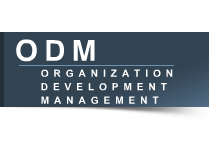Organization Development
From Wikipedia, the free encyclopedia
Organization development is the process through which an organization develops the internal capacity to most efficiently and effectively provide its mission work and to sustain itself over the long term. This definition highlights the explicit connection between organizational development work and the achievement of organizational mission. This connection is the rationale for doing OD work. Organization development, according to Richard Beckhard, is defined as: a planned effort, organization-wide, managed from the top, to increase organization effectiveness and health, through planned interventions in the organization's 'processes', using behavioural science knowledge.[1]There are also a number of methodologies specifically dedicated to Organization Development such as Peter Senge’s 5th Discipline and Arthur F. Carmazzi’s Directive Communication. These are a few of more popular approaches that have been developed into a system for specific outcomes such as the 5th Discipline’s “learning organization” or Directive Communication’s “Organizational culture enhancement”.
According to Warren Bennis, organization development (OD) is a complex strategy intended to change the beliefs, attitudes, values, and structure of organizations so that they can better adapt to new technologies, markets, and challenges.
Warner Burke emphasizes that OD is not just "anything done to better an organization"; it is a particular kind of change process designed to bring about a particular kind of end result. OD involves organizational reflection, system improvement, planning, and self-analysis.
The term "Organization Development" is often used interchangeably with Organizational effectiveness, especially when used as the name of a department or a part of the Human Resources function within an organization.
Organization Development is a growing field that is responsive to many new approached including Positive Adult Development.
Contents[hide] |
[edit] Definition
At the core of OD is the concept of an organization, defined as two or more people working together toward one or more shared goals. Development in this context is the notion that an organization may become more effective over time at achieving its goals.
"OD is a long range effort to improve organization's problem solving and renewal processes, particularly through more effective and collaborative management of organization culture-with specific emphasis on the culture of formal workteams-with the assistance of a change agent or catalyst and the use of the theory and technology of applied behavioral science including action research"
[edit] History
Kurt Lewin (1898 - 1947) is widely recognized as the founding father of OD, although he died before the concept became current in the mid-1950s. From Lewin came the ideas of group dynamics, and action research which underpin the basic OD process as well as providing its collaborative consultant/client ethos. Institutionally, Lewin founded the Research Center for Group Dynamics at MIT, which moved to Michigan after his death. RCGD colleagues were among those who founded the National Training Laboratories (NTL), from which the T-group and group-based OD emerged. In the UK, working as close as was possible with Lewin and his colleagues, the Tavistock Institute of Human Relations was important in developing systems theories. Important too was the joint TIHR journal Human Relations, although nowadays the Journal of Applied Behavioral Sciences is seen as the leading OD journal.
In recent years, serious questioning has emerged about the relevance of OD to managing change in modern organizations. The need for "reinventing" the field has become a topic that even some of its "founding fathers" are discussing critically. [2]
[edit] Important figures
- Chris Argyris
- Richard Beckhard
- Arthur Carmazzi
- Kenneth Benne
- Robert R. Blake
- Leland Bradford
- W. Warner Burke
- Tom Cummings
- Fred Emery
- Charles Handy
- Elliott Jaques
- Kurt Lewin
- Rensis Likert
- Gordon Lippitt
- Ronald Lippitt
- Jane Mouton
- William J. Rothwell
- Edgar Schein
- Donald Schon
- Peter Senge
- Eric Trist
- Saul Eisen
[edit] See also
- OD topics
- Action research
- Appreciative inquiry
- Chaos theory in organizational development
- Collaboration
- Collaborative method
- Employee research
- Executive development
- Group process & Group development
- Knowledge Management
- Leadership development
- Managing change
- Organizational communication
- Organizational culture
- Organizational engineering
- Organizational learning
- Organizational performance
- Performance improvement
- Positive Adult Development
- Process improvement
- Quality
- Social network
- Strategic planning
- Succession planning
- Systems intelligence
- Systems thinking
- Team building
- T-groups
- Value network
- Workplace democracy
- Workplace spirituality
- Workforce planning
- Milestones
- OD in context
- Change management
- Coaching
- Facilitation
- Human resources
- Industrial and organizational psychology
- Training and development
[edit] References
- ^ Smith, 1998, p261. Training and Development in Australia
- ^ Bradford, D.L. & Burke, W.W.(eds), 2005, Reinventing Organization Development. San Francisco: Pfeiffer.


No comments:
Post a Comment